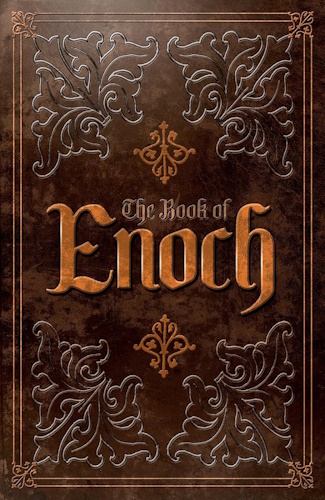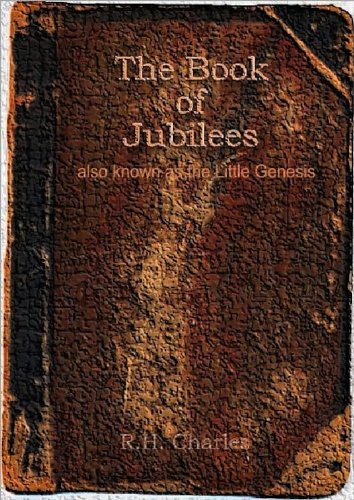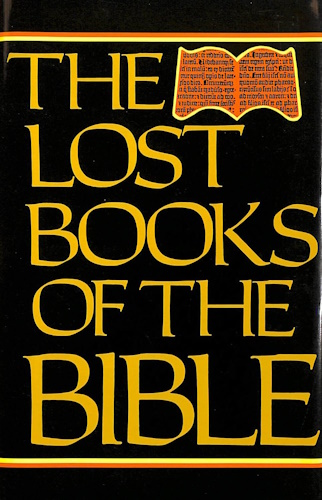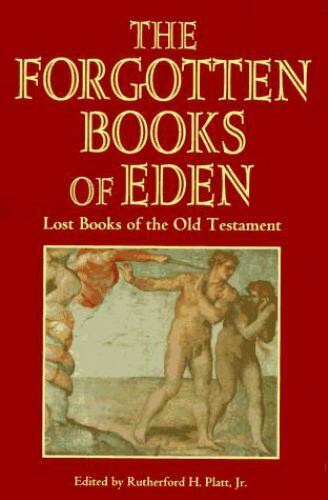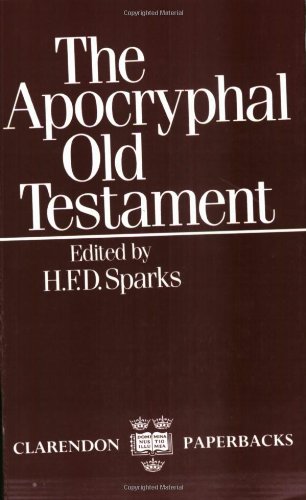
The Apocalypse of Sedrach
The Word of the holy and blessed Sedrach concerning love and concerning repentance and Orthodox Christians, and concerning the Second Coming of our Lord Jesus Christ. Lord give your blessing.
I. Beloved, let us prefer nothing in honour except sincere love: for in many things we stumble every day and night and hour. And for this cause let us gain love, for it covers a multitude of sins: for what is the profit, my children, if we have all things, and have not saving love...
O blessed love, supplier of all good things. Blessed is the man who has gained the true faith and sincere love, according as the Master said, there is no greater love than this that a man should lay down his life for his friend. Cf. John xv. 13.
II. And invisibly he received a voice in his ears: Come hither, Sedrach, since you wish and desirest to converse with God and ask of him that he may reveal unto you whatever you wish to ask. And Sedrach said: What, Sir? And the voice said to him: I was sent to you to raise you here into heaven. And he said: I desired to speak mouth to mouth with God: I am not fit, Sir, to come into heaven. And stretching out his wings he took him up and he came into heaven to the very flame, and he set him as high as the third heaven, and in it stood the flame of the divinity.
III. And the Lord says to him: Welcome, my beloved Sedrach: What suit have you against God who created you, that you said, I desired to speak face to face with God? Sedrach says to him: Yea, verily, the son has a suit with the Father: my Lord, why did you make the earth? The Lord says to him: For man's sake. Sedrach says: And why did You make the sea? Why did You scatter every good thing on the earth? The Lord says to him: For man's sake. Sedrach says to him: If you did these things, why will You destroy him? And the Lord said: Man is my work and the creature of my hands, and I discipline him as I find good.
IV. Sedrach says to him: Chastisement and fire are your discipline: they are bitter, my Lord: it were well for man if he had not been born: why then did you make him, my Lord? Why did you weary your undefiled hands and create man, since you did not intend to have mercy on him? God says to him: I made Adam the first creature and placed him in Paradise in the midst of the tree of life and said to him: Eat of all the fruits, but beware of the tree of life: for if you eat of it, you shall die the death. But he transgressed my commandment, and being beguiled by the devil ate of the tree.
V. Sedrach says to him: Of your will Adam was beguiled, my Lord: You command your angels to make approach to Adam, and the first of the angels himself transgressed your commandment and did not make approach to him, and You banished him, because he transgressed your commandment and did not make any approach to the work of your hands: if you loved man, why did You not slay the devil, the worker of unrighteousness? Who is able to fight an invisible spirit? And he enters like smoke into the hearts of men and teaches them every sin: he fights against you, the immortal God, and what can wretched man then do to him? But have mercy, O Lord, and stop the chastisements: but if not, count me also with the sinners: if you will have no mercy on the sinners, where are your mercies, where is your compassion, O Lord?
VI. God says to him: Be it known unto you that I ordered all things to be placable to him: I gave him understanding and made him the heir of heaven and earth, and I subjected all things to him, and every living thing flees from him and from before his face: but he, having received of mine, became alien, adulterous, and sinful: tell me, what father, having given his son his portion, when he takes his substance and leaves his father and goes away and becomes an alien and serves an alien, when the father sees that the son has deserted him, does not darken his heart, and does not the father go and take his substance and banish him from his glory because he deserted his father? And how have I, the wonderful and jealous God, given him everything, and he having received these things has become an adulterer and a sinner?
VII. Sedrach says to him: You, O Lord, created man. You knew of what sort of mind he was and of what sort of knowledge we are, and you make it a cause for chastisement: but cast him forth; for shall not I alone fill up the heavenly places? But if that is not to be so save man too, O Lord. He failed by your will, wretched man. Why do you waste words on me, Sedrach? I created Adam and his wife and the sun and said: Behold each other how bright he is, and the wife of Adam is brighter in the beauty of the moon and he was the giver of her life. Sedrach says: but of what profit are beauties if they die away into the earth? How did you say, O Lord, You shall not return evil for evil? How is it, O Lord? the word of Your divinity never lies, and why do You retaliate on man? or do you not in so doing render evil for evil? I know that among the quadrupeds there is no other so wily and unreasonable as the mule. But we strike it with the bridle when we wish: and you have angels: send them forth to guard them, and when man inclines towards sin, to take hold of his foot and not let him go whither he would.
VIII. God says to him: If I catch him by the foot, he will say, You have given me no joy in the world. But I have left him to his own will because I loved him. Wherefore I sent forth my righteous angels to guard him night and day. Sedrach says: I know, O Lord, that of all your creatures You chiefly loved man, of the quadrupeds the sheep, of woods the olive, of fruits the vine, of flying things the bee, of rivers the Jordan, of cities Jerusalem. And all these man also loves, my Lord. God says to Sedrach: I will ask you one thing, Sedrach: if you answer me, then I may fitly help you, even though you have tempted your creator. Sedrach says: Speak. The Lord God says: Since I made all things, how many men were born and how many died, and how many are to die and how many hairs have they? Tell me, Sedrach, since the heaven was created and the earth, how many trees grew in the world, and how many fell, and how many are to fall, and how many are to arise, and how many leaves have they? Tell me, Sedrach, since I made the sea, how many waves arose and how many fell, and how many are to arise, and how many winds blow along the margin of the sea? Tell me, Sedrach, from the creation of the world of the æons, when the air rained, how many drops fell upon the world, and how many are to fall? And Sedrach said: You alone know all these things, O Lord; you only understand all these things: only, I pray you, deliver man from chastisement, and I shall not be separated from our race.
IX. And God said to his only begotten Son: Go, take the soul of Sedrach my beloved, and place it in Paradise. The only begotten Son says to Sedrach: Give me the trust which our Father deposited in the womb of your mother in the holy tabernacle of your body from a child. Sedrach says: I will not give you my soul. God says to him: And wherefore was I sent to come hither, and you plead against me? For I was commanded by my Father not to take your soul with violence; but if not, (then) give me your most greatly desired soul.
X. And Sedrach says to God: And whence do You intend to take my soul, and from which limb? And God says to him: Do you not know that it is placed in the midst of your lungs and your heart and is dispersed into all your limbs? It is brought up through the throat and gullet and the mouth and at whatever hour it is predestined to come forth, it is scattered, and brought together from the points of the nails and from all the limbs, and there is a great necessity that it should be separated from the body and parted from the heart. When Sedrach had heard all these things and had considered the memory of death he was greatly astounded, and Sedrach said to God: O Lord, give me a little respite that I may weep, for I have heard that tears are able to do much and much remedy comes to the lowly body of your creature.
XI. And weeping and bewailing he began to say: O marvellous head of heavenly adornment: O radiant as the sun which shines on heaven and earth: your hairs are known from Teman, your eyes from Bosor, your ears from thunder, your tongue from a trumpet, and your brain is a small creation, your head the energy of the whole body: O friendly and most fair beloved by all, and now falling into the earth it must become forgotten. O hands, mild, fair-fingered, worn with toil by which the body is nourished: O hands, deftest of all, heaping up from all quarters you made ready houses. O fingers adorned and decked with gold and silver (rings): and great worlds are led by the fingers: the three joints enfold the palms, and heap up beautiful things: and now you must become aliens to the world. O feet, skilfully walking about, self-running, most swift, unconquerable: O knees, fitted together, because without you the body does not move: the feet run along with the sun and the moon in the night and in the day, heaping up all things, foods and drinks, and nourishing the body: O feet, most swift and fair runners, moving on the face of the earth, getting ready the house with every good thing: O feet which bear up the whole body, that run up to the temples, making repentance and calling on the saints, and now you are to remain motionless. O head and hands and feet, until now I have kept you. O soul, what sent you into the humble and wretched body? And now being separated from it, you are going up where the Lord calls you, and the wretched body goes away to judgment. O body well-adorned, hair clothed with stars, head of heavenly adornment and dress: O face well-anointed, light-bringing eyes, voice trumpet-like, tongue placable, chin fairly adorned, hairs like the stars, head high as heaven, body decked out, light-bringing eyes that know all things— and now you shall fall into the earth and under the earth your beauty shall disappear.
XII. Christ says to him: Stay, Sedrach; how long do you weep and groan? Paradise is opened to you, and, dying, you shall live. Sedrach says to him: Once more I will speak unto you, O Lord: How long shall I live before I die? And do not disregard my prayer. The Lord says to him: Speak, O Sedrach. Sedrach says: If a man shall live eighty or ninety or an hundred years, and live these years in sin, and again shall turn, and the man live in repentance, in how many days do you forgive him his sins? God says to him: If he shall live an hundred or eighty years and shall turn and repent for three years and do the fruit of righteousness, and death shall overtake him, I will not remember all his sins.
XIII. Sedrach says to him: The three years are a long time, my Lord, lest death overtake him and he fulfil not his repentance: have mercy, Lord, on your image and have compassion, for the three years are many. God says to him: If a man live an hundred years and remember his death and confess before men and I find him, after a time I will forgive all his sins. Sedrach says again: I will again beseech your compassion for your creature. The time is long lest death overtake him and snatch him suddenly. The Saviour says to him: I will ask you one word, Sedrach, my beloved, then you shall ask me in turn: if the man shall repent for forty days I will not remember all his sins which he did.
XIV. And Sedrach says to the archangel Michael: Hearken to me, O powerful chief, and help me and be my envoy that God may have mercy on the world. And falling on their faces, they besought the Lord and said: O Lord, teach us how and by what sort of repentance and by what labour man shall be saved. God says: By repentances, by intercessions, by liturgies, by tears in streams, in hot groanings. Do you not know that my prophet David was saved by tears, and the rest were saved in one moment? You know, Sedrach, that there are nations which have not the law and which do the works of the law: for if they are unbaptized and my divine spirit come unto them and they turn to my baptism, I also receive them with my righteous ones into Abraham's bosom. And there are some who have been baptized with my baptism and who have shared in my divine part and become reprobate in complete reprobation and will not repent: and I suffer them with much compassion and much pity and wealth Romans 2:4 in order that they may repent, but they do the things which my divinity hates, and did not hearken to the wise man asking (them), saying, we by no means justify a sinner. Do you not most certainly know that it is written: And those who repent never see chastisement? And they did not hearken to the Apostles or to my word in the Gospels, and they grieve my angels, and verily they do not attend to my messenger in the assemblies (for communion) and in my services, and they do not stand in my holy churches, but they stand and do not fall down and worship in fear and trembling, but boast things which I do not accept, or my holy angels.
XV. Sedrach says to God: O Lord, You alone are sinless and very compassionate, having compassion and pity for sinners, but your divinity said: I am not come to call the righteous but sinners to repentance. And the Lord said to Sedrach: Do you not know, Sedrach, that the thief was saved in one moment to repent? Do you not know that my apostle and evangelist was saved in one moment? Peccatores enim non salvantur, for their hearts are like rotten stone: these are they who walk in impious ways and who shall be destroyed with Antichrist. Sedrach says: O my Lord, You also said: My divine spirit entered into the nations which, not having the law, do the things of the law. So also the thief and the apostle and evangelist and the rest of those who have already got into your Kingdom. O my Lord; so likewise do You pardon those who have sinned to the last: for life is very toilsome and there is no time for repentance.
XVI. The Lord says to Sedrach: I made man in three stages: when he is young, I overlooked his stumblings as he was young: and again when he was a man I considered his purpose: and again when he grows old, I watch him till he repent. Sedrach says: O Lord, You know and understandest all these things: but have sympathy for sinners. The Lord says to him: Sedrach, my beloved, I promise to have sympathy and bring down the forty days to twenty: and whosoever shall remember your name shall not see the place of chastisement, but shall be with the just in a place of refreshment and rest: and if anyone shall record this wonderful word his sins shall not be reckoned against him for ever and ever. And Sedrach says: O Lord, and if anyone shall bring enlightenment to your servant, save him, O Lord, from all evil. And Sedrach, the servant of the Lord, says: Now take my soul, O Lord. And God took him and placed him in Paradise with all the saints. To whom be the glory and the power for ever and ever. Amen.
![]()
![]()
-
Urantia Book, 44:0.11 - The Celestial Artisans
Never in your long ascendancy will you lose the power to recognize your associates of former existences. Always, as you ascend inward in the scale of life, will you retain the ability to recognize and fraternize with the fellow beings of your previous and lower levels of experience. Each new translation or resurrection will add one more group of spirit beings to your vision range without in the least depriving you of the ability to recognize your friends and fellows of former estates.
-
Princess Bride 1987 Wallace Shawn (Vizzini) and Mandy Patinkin (Inigo Montoya)
Vizzini: HE DIDN'T FALL? INCONCEIVABLE.
Inigo Montoya: You keep using that word. I do not think it means what you think it means. -
Urantia Book, 117:4.14 - The Finite God
And here is mystery: The more closely man approaches God through love, the greater the reality -- actuality -- of that man. The more man withdraws from God, the more nearly he approaches nonreality -- cessation of existence. When man consecrates his will to the doing of the Father's will, when man gives God all that he has, then does God make that man more than he is.
-
Urantia Book, 167:7.4 - The Talk About Angels
"And do you not remember that I said to you once before that, if you had your spiritual eyes anointed, you would then see the heavens opened and behold the angels of God ascending and descending? It is by the ministry of the angels that one world may be kept in touch with other worlds, for have I not repeatedly told you that I have other sheep not of this fold?"
-
Urantia Book, Foreword - 0:12.12 - The Trinities
But we know that there dwells within the human mind a fragment of God, and that there sojourns with the human soul the Spirit of Truth; and we further know that these spirit forces conspire to enable material man to grasp the reality of spiritual values and to comprehend the philosophy of universe meanings. But even more certainly we know that these spirits of the Divine Presence are able to assist man in the spiritual appropriation of all truth contributory to the enhancement of the ever-progressing reality of personal religious experience—God-consciousness.
-
Urantia Book, 1:4.3 - The Mystery Of God
When you are through down here, when your course has been run in temporary form on earth, when your trial trip in the flesh is finished, when the dust that composes the mortal tabernacle "returns to the earth whence it came"; then, it is revealed, the indwelling "Spirit shall return to God who gave it." There sojourns within each moral being of this planet a fragment of God, a part and parcel of divinity. It is not yet yours by right of possession, but it is designedly intended to be one with you if you survive the mortal existence.
-
Urantia Book, 1:4.1 - The Mystery Of God
And the greatest of all the unfathomable mysteries of God is the phenomenon of the divine indwelling of mortal minds. The manner in which the Universal Father sojourns with the creatures of time is the most profound of all universe mysteries; the divine presence in the mind of man is the mystery of mysteries.
-
Urantia Book, 1:4.6 - The Mystery Of God
To every spirit being and to every mortal creature in every sphere and on every world of the universe of universes, the Universal Father reveals all of his gracious and divine self that can be discerned or comprehended by such spirit beings and by such mortal creatures. God is no respecter of persons, either spiritual or material. The divine presence which any child of the universe enjoys at any given moment is limited only by the capacity of such a creature to receive and to discern the spirit actualities of the supermaterial world.
-
Urantia Book, 11:0.1 - The Eternal Isle Of Paradise
Paradise is the eternal center of the universe of universes and the abiding place of the Universal Father, the Eternal Son, the Infinite Spirit, and their divine co-ordinates and associates. This central Isle is the most gigantic organized body of cosmic reality in all the master universe. Paradise is a material sphere as well as a spiritual abode. All of the intelligent creation of the Universal Father is domiciled on material abodes; hence must the absolute controlling center also be material, literal. And again it should be reiterated that spirit things and spiritual beings are real.
-
Urantia Book, 50:6.4 - Planetary Culture
Culture presupposes quality of mind; culture cannot be enhanced unless mind is elevated. Superior intellect will seek a noble culture and find some way to attain such a goal. Inferior minds will spurn the highest culture even when presented to them ready-made.
-
Urantia Book, 54:1.6 - True And False Liberty
True liberty is the associate of genuine self-respect; false liberty is the consort of self-admiration. True liberty is the fruit of self-control; false liberty, the assumption of self-assertion. Self-control leads to altruistic service; self-admiration tends towards the exploitation of others for the selfish aggrandizement of such a mistaken individual as is willing to sacrifice righteous attainment for the sake of possessing unjust power over his fellow beings.
-
Urantia Book, 54:1.9 - True And False Liberty
How dare the self-willed creature encroach upon the rights of his fellows in the name of personal liberty when the Supreme Rulers of the universe stand back in merciful respect for these prerogatives of will and potentials of personality! No being, in the exercise of his supposed personal liberty, has a right to deprive any other being of those privileges of existence conferred by the Creators and duly respected by all their loyal associates, subordinates, and subjects.
-
Urantia Book, 54:1.8 - True And False Liberty
There is no error greater than that species of self-deception which leads intelligent beings to crave the exercise of power over other beings for the purpose of depriving these persons of their natural liberties. The golden rule of human fairness cries out against all such fraud, unfairness, selfishness, and unrighteousness.





